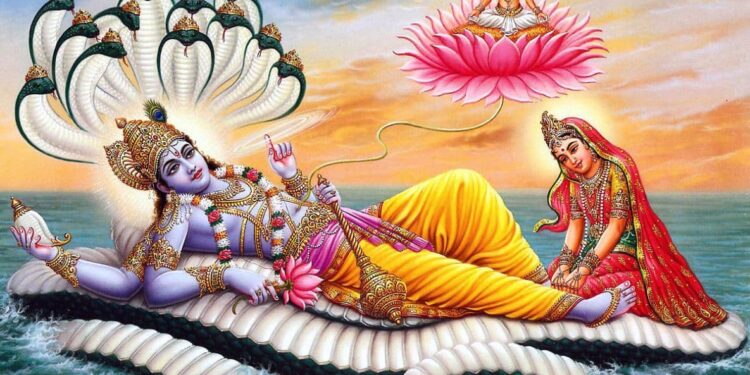Lord Vishnu is one of the principal deities in Hinduism, and is often regarded as the preserver and protector of the universe. He is considered to be one of the three main manifestations of Brahman, the supreme reality in Hinduism, along with Shiva and Brahma. Lord Vishnu is known by several other names, including Narayana, Hari, and Govinda, among others. He is often depicted as having a blue complexion, holding a conch shell, a discus, a mace, and a lotus flower, and riding on the back of the mythical bird Garuda. In Hindu philosophy, Lord Vishnu is associated with a range of symbolism, which has significant spiritual significance and meaning.
One of the most important symbols associated with Lord Vishnu is the idea of preservation. According to Hindu mythology, Lord Vishnu is responsible for preserving the universe and preventing it from being destroyed. This is reflected in his physical depiction, as he is often shown holding a conch shell, which is said to represent the primordial sound that created the universe. The conch shell is also said to symbolize the power of speech, and its sound is believed to be able to purify the mind and the body.
Another important symbol associated with Lord Vishnu is the lotus flower. The lotus is often depicted as emerging from the navel of Lord Vishnu, and is said to represent the idea of purity and enlightenment. The lotus is also associated with creation, as it is believed to be the birthplace of the Hindu god Brahma, who is responsible for creating the universe.
Lord Vishnu is also associated with the idea of balance and harmony. In Hindu mythology, Lord Vishnu is said to have taken on various incarnations or avatars, in order to restore balance to the universe. These incarnations include Rama and Krishna, among others, and are said to represent different aspects of Lord Vishnu’s character. For example, Rama is associated with the idea of righteousness and duty, while Krishna is associated with the idea of love and compassion.
In addition to these symbols, Lord Vishnu is also associated with the idea of detachment and renunciation. This is reflected in his physical depiction, as he is often shown with his eyes closed, and is said to be detached from the material world. This detachment is believed to be necessary in order to achieve spiritual enlightenment and liberation.
Overall, the symbolism of Lord Vishnu in Hindu philosophy reflects the importance of balance, harmony, preservation, and detachment in achieving spiritual enlightenment. These symbols provide important insights into the nature of the divine, and are an essential part of Hindu mythology and philosophy.


















Discussion about this post